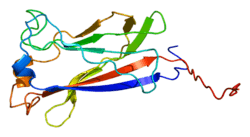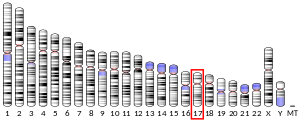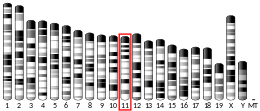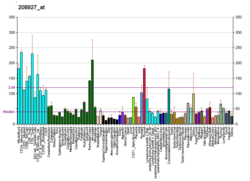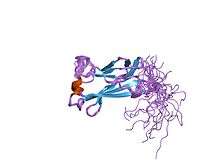SPOP
Speckle-type POZ protein is a protein that in humans is encoded by the SPOP gene.[5][6][7]
- Disambiguation: For the animated series see She-Ra: Princess of Power.
- For the Singaporean singing competition, see SPOP Sing!
This gene encodes a protein that may modulate the transcriptional repression activities of death-associated protein 6 (DAXX), which interacts with histone deacetylase, core histones, and other histone-associated proteins. In mouse, the encoded protein binds to the putative leucine zipper domain of macroH2A1.2, a variant H2A histone that is enriched on inactivated X chromosomes. The BTB/POZ domain of this protein has been shown in other proteins to mediate transcriptional repression and to interact with components of histone deacetylase co-repressor complexes. Alternative splicing of this gene results in multiple transcript variants encoding the same protein.[7]
Clinical relevance
Mutations in SPOP lead to a type of prostate tumor thought to be involved in about 15% of all prostate cancers.[8][9]
References
- GRCh38: Ensembl release 89: ENSG00000121067 - Ensembl, May 2017
- GRCm38: Ensembl release 89: ENSMUSG00000057522 - Ensembl, May 2017
- "Human PubMed Reference:". National Center for Biotechnology Information, U.S. National Library of Medicine.
- "Mouse PubMed Reference:". National Center for Biotechnology Information, U.S. National Library of Medicine.
- Nagai Y, Kojima T, Muro Y, Hachiya T, Nishizawa Y, Wakabayashi T, Hagiwara M (Nov 1997). "Identification of a novel nuclear speckle-type protein, SPOP". FEBS Letters. 418 (1–2): 23–6. doi:10.1016/S0014-5793(97)01340-9. PMID 9414087.
- Zapata JM, Pawlowski K, Haas E, Ware CF, Godzik A, Reed JC (Jun 2001). "A diverse family of proteins containing tumor necrosis factor receptor-associated factor domains". The Journal of Biological Chemistry. 276 (26): 24242–52. doi:10.1074/jbc.M100354200. PMID 11279055.
- "Entrez Gene: SPOP speckle-type POZ protein".
- Heidi Evans (20 May 2012). "Scientists find new type of prostate cancer - discovery may lead to tailored treatments". New York Daily News. Retrieved 20 May 2012.
- Barbieri CE, Baca SC, Lawrence MS, Demichelis F, Blattner M, Theurillat JP, White TA, Stojanov P, Van Allen E, Stransky N, Nickerson E, Chae SS, Boysen G, Auclair D, Onofrio RC, Park K, Kitabayashi N, MacDonald TY, Sheikh K, Vuong T, Guiducci C, Cibulskis K, Sivachenko A, Carter SL, Saksena G, Voet D, Hussain WM, Ramos AH, Winckler W, Redman MC, Ardlie K, Tewari AK, Mosquera JM, Rupp N, Wild PJ, Moch H, Morrissey C, Nelson PS, Kantoff PW, Gabriel SB, Golub TR, Meyerson M, Lander ES, Getz G, Rubin MA, Garraway LA (Jun 2012). "Exome sequencing identifies recurrent SPOP, FOXA1 and MED12 mutations in prostate cancer". Nature Genetics. 44 (6): 685–9. doi:10.1038/ng.2279. PMC 3673022. PMID 22610119.
Further reading
- Maruyama K, Sugano S (Jan 1994). "Oligo-capping: a simple method to replace the cap structure of eukaryotic mRNAs with oligoribonucleotides". Gene. 138 (1–2): 171–4. doi:10.1016/0378-1119(94)90802-8. PMID 8125298.
- Bonaldo MF, Lennon G, Soares MB (Sep 1996). "Normalization and subtraction: two approaches to facilitate gene discovery". Genome Research. 6 (9): 791–806. doi:10.1101/gr.6.9.791. PMID 8889548.
- Suzuki Y, Yoshitomo-Nakagawa K, Maruyama K, Suyama A, Sugano S (Oct 1997). "Construction and characterization of a full length-enriched and a 5'-end-enriched cDNA library". Gene. 200 (1–2): 149–56. doi:10.1016/S0378-1119(97)00411-3. PMID 9373149.
- Wu J, Song Y, Bakker AB, Bauer S, Spies T, Lanier LL, Phillips JH (Jul 1999). "An activating immunoreceptor complex formed by NKG2D and DAP10". Science. 285 (5428): 730–2. doi:10.1126/science.285.5428.730. PMID 10426994.
- Hartley JL, Temple GF, Brasch MA (Nov 2000). "DNA cloning using in vitro site-specific recombination". Genome Research. 10 (11): 1788–95. doi:10.1101/gr.143000. PMC 310948. PMID 11076863.
- Zapata JM, Pawlowski K, Haas E, Ware CF, Godzik A, Reed JC (Jun 2001). "A diverse family of proteins containing tumor necrosis factor receptor-associated factor domains". The Journal of Biological Chemistry. 276 (26): 24242–52. doi:10.1074/jbc.M100354200. PMID 11279055.
- Takahashi I, Kameoka Y, Hashimoto K (Aug 2002). "MacroH2A1.2 binds the nuclear protein Spop". Biochimica et Biophysica Acta (BBA) - Molecular Cell Research. 1591 (1–3): 63–8. doi:10.1016/S0167-4889(02)00249-5. PMID 12183056.
- Gilfillan S, Ho EL, Cella M, Yokoyama WM, Colonna M (Dec 2002). "NKG2D recruits two distinct adapters to trigger NK cell activation and costimulation". Nature Immunology. 3 (12): 1150–5. doi:10.1038/ni857. PMID 12426564.
- Diefenbach A, Tomasello E, Lucas M, Jamieson AM, Hsia JK, Vivier E, Raulet DH (Dec 2002). "Selective associations with signaling proteins determine stimulatory versus costimulatory activity of NKG2D". Nature Immunology. 3 (12): 1142–9. doi:10.1038/ni858. PMID 12426565.
- Billadeau DD, Upshaw JL, Schoon RA, Dick CJ, Leibson PJ (Jun 2003). "NKG2D-DAP10 triggers human NK cell-mediated killing via a Syk-independent regulatory pathway". Nature Immunology. 4 (6): 557–64. doi:10.1038/ni929. PMID 12740575.
- Liu A, Desai BM, Stoffers DA (May 2004). "Identification of PCIF1, a POZ domain protein that inhibits PDX-1 (MODY4) transcriptional activity". Molecular and Cellular Biology. 24 (10): 4372–83. doi:10.1128/MCB.24.10.4372-4383.2004. PMC 400448. PMID 15121856.
- La M, Kim K, Park J, Won J, Lee JH, Fu YM, Meadows GG, Joe CO (Jul 2004). "Daxx-mediated transcriptional repression of MMP1 gene is reversed by SPOP". Biochemical and Biophysical Research Communications. 320 (3): 760–5. doi:10.1016/j.bbrc.2004.06.022. PMID 15240113.
- Wiemann S, Arlt D, Huber W, Wellenreuther R, Schleeger S, Mehrle A, Bechtel S, Sauermann M, Korf U, Pepperkok R, Sültmann H, Poustka A (Oct 2004). "From ORFeome to biology: a functional genomics pipeline". Genome Research. 14 (10B): 2136–44. doi:10.1101/gr.2576704. PMC 528930. PMID 15489336.
- Hernández-Muñoz I, Lund AH, van der Stoop P, Boutsma E, Muijrers I, Verhoeven E, Nusinow DA, Panning B, Marahrens Y, van Lohuizen M (May 2005). "Stable X chromosome inactivation involves the PRC1 Polycomb complex and requires histone MACROH2A1 and the CULLIN3/SPOP ubiquitin E3 ligase". Proceedings of the National Academy of Sciences of the United States of America. 102 (21): 7635–40. doi:10.1073/pnas.0408918102. PMC 1140410. PMID 15897469.
- Rual JF, Venkatesan K, Hao T, Hirozane-Kishikawa T, Dricot A, Li N, Berriz GF, Gibbons FD, Dreze M, Ayivi-Guedehoussou N, Klitgord N, Simon C, Boxem M, Milstein S, Rosenberg J, Goldberg DS, Zhang LV, Wong SL, Franklin G, Li S, Albala JS, Lim J, Fraughton C, Llamosas E, Cevik S, Bex C, Lamesch P, Sikorski RS, Vandenhaute J, Zoghbi HY, Smolyar A, Bosak S, Sequerra R, Doucette-Stamm L, Cusick ME, Hill DE, Roth FP, Vidal M (Oct 2005). "Towards a proteome-scale map of the human protein-protein interaction network". Nature. 437 (7062): 1173–8. doi:10.1038/nature04209. PMID 16189514.
- Mehrle A, Rosenfelder H, Schupp I, del Val C, Arlt D, Hahne F, Bechtel S, Simpson J, Hofmann O, Hide W, Glatting KH, Huber W, Pepperkok R, Poustka A, Wiemann S (Jan 2006). "The LIFEdb database in 2006". Nucleic Acids Research. 34 (Database issue): D415-8. doi:10.1093/nar/gkj139. PMC 1347501. PMID 16381901.
